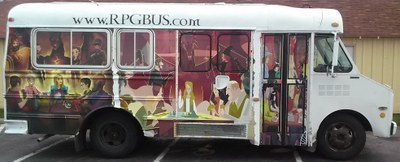Incorporating RPG into Clinical Practice Presentation at WSTRA 2018 by RPG Research & RPG Therapeutics
If you want information on how to bring role-playing games into your clinical practice, care facility, and other care services, whether you are a Recreational Therapist or other care professional, you will find this presentation useful.
This is also the maiden voyage for the RPG Bus (part of the RPG Fleet: Command staff RPG SUV, wheelchair friendly RPG Trailer, & wheelchair accessible RPG Bus).
Here is the conference schedule: http://wstra.org/2018/03/12/2018-conference-registration/
It is not too late to get tickets to attend this conference: https://www.eventbrite.com/e/2018-wstra-annual-conference-tickets-43059293506
Speaker will be RPG Advocate Trainee Danielle Whitworth of RPG Research and Hawke Robinson Founder of RPG Research and President of RPG Therapeutics LLC.
Here is the presentation summary:
Title of Session
RPG TRS GM Step 1: How to Develop and Integrate Role-Playing Games as an Intervention Modality into Therapeutic Recreation Programs.
Session Description
At previous WSTRA/PNWATRA presentations many asked: “I now see how clients benefit from RPGs, but how do I integrate them into my programs?”.
Recordings of previous presentations: http://youtube.com/rpgresearch
Learning to play an RPG is easy, however running them well can take many trial & error experiences spanning years, to develop the necessary skills. Plus adaptations for specific population needs to achieve client therapeutic and educational goals can be even more daunting. But there are other options to quickly develop these skills.
All 4 RPG formats discussed: tabletop, live-action, solo books, & computer-based including AR & VR.
Includes information on:
-
Professional standards
-
Formal training
-
Facilities considerations, including mobile options
-
Additional resources
Specific program plans for TRSs interested in integrating RPGs into their programs, including a skill development road map.
Example facility applications include:
-
Community centers
-
Rehabilitation
-
Mental health
-
Summer camps
-
Clinical to community transitions
Specific population program plans:
-
ASD/PDD toddlers, youth, & adults
-
At-risk & troubled youth
-
Brain injury
-
Muscular Dystrophy & related.
Speaker Qualifications
Currently senior undergraduate student at EWU, interdisciplinary degree in Therapeutic Recreation Music Therapy, Neuroscience, & Research Psychology. Washington state registered Recreational Therapist since 2014 (#RE60526204), working toward CTRS. Student member of WSTRA, PNWATRA, & ATRA. Retired computer scientist, CIO & CTO. Founder & Primary Investigator for incorporated non-profit RPG Research www.rpgresearch.com, since 2004. President of for-profit RPG Therapeutics LLC. Convention Accessibility Advocate. Role-playing gamer since 1979. Work with Deaf & hard of hearing, at-risk youth, ASD/PDD, ADD/ADHD, Parkinson’s, CP, Down Syndrome, brain injury (stroke, TBI), spinal cord injury, MD, and many other populations.
Aggregate of news coverage and publications: http://www2.rpgresearch.com/blog/amalgamation-of-panels-q-a-interviews-presentations-on-rpg-for-therapy-education
Speaker Biography: http://www2.rpgresearch.com/staff/hawke-robinson
Instructional Methods
Lecture with some audience participation, followed by Q&A discussion. Initial lecture with slide show presentation (includes audio & video) and array of example RPG-related materials (dice, miniatures, maps, modules, & books), interactive discussions and examples shared with audience participants, short interactive verbal quiz, followed by open audience Q&A.
Learning Outcomes
Upon completion of this session, participants be able to:
-
Explain the first steps to integrating RPGs into a TR program.
-
Identify the list of resources available for TRS professionals to develop RPG Facilitation skills, and the steps for a TR professional to utilize those resources.
-
Summarize a typical Therapeutic Recreation Specialist Game Master (TRS GM) road map for skill development.
-
Explain the basic steps necessary to integrate TR-based RPG from program design & implementation, to assessment and revision.
-
List at least 3 populations that can benefit from TR-based RPG, including specific benefits and adaptations.
-
List at least 3 facility types where TR-based RPGs can be utilized effectively.
Session Outline
Minimum 90 minutes as proposed, additional time allows more detailed specific program plan examples. Could be paired down to 60 minutes for a more high-level overview with less detail.
-
Introduction
-
Brief summary of RPG history & therapeutic RPG research results.
-
Brief overview and explanation of key components of a role-playing game, and the differences in formats (tabletop, solo adventure books & modules, computer-based, and live-action).
-
Specific steps to begin learning RPG as a player.
-
Specific steps for a TRS to develop RPG Game Master (GM) skills.
-
Several specific TR RPG program plan examples.
-
Key resources available.
-
Formal training and certification, and how to acquire it.
-
Summary and interactive audience Q&A.
NCTRC Job Analysis Areas
-
Foundational Knowledge (FKW)
-
Practice of TR/RT
Speaker Information
Name: W. A. Hawkes-Robinson (“Hawke Robinson”)
Title: Student: EWU, President RPG Research Inc, CEO RPG Therapeutics LLC.
Agency: RPG Research and RPG Therapeutics LLC.
Mailing Address: 1312 N. Monroe, Suite #114
City, State & Zip: Spokane, WA, 99201
Phone/Text: (509) 481-5437
Resource/Reference List: http://rpgresearch.com
Document Actions



